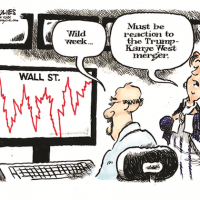-
A Marxist History of Capitalism
An important work of Marxist history and theory restores class struggle to central place in explaining how capitalism arose and grew, and can eventually be overcome.
-
Confronting imperialism means winning back the power to imagine alternatives
Vijay Prashad talks to Daniel Whittall about socialism, anti-imperialism and the new global research network Tricontinental.
-
Goosing the corporate goose
No, the stock market is not predictable. And no one knows the exact causes of last week’s carnage on Wall Street—with the Dow down 4.2 percent, the S&P 4.1 percent and the Nasdaq 3.7 percent, representing their worst weekly performances since March.
-
Marx & the Earth: An Anti-Critique
If there is one thing from which Green thinking and practice suffers, it is the lack of an over-arching historical and socioeconomic conceptualisation of the dynamics making for the trashing of the environment as habit for humans and other creatures.
-
The U.S. medical system: healthy profits at people’s expense
The health-care industry overtook the retail sector as the nation’s largest employer in December, giving local economies and their workers a stake in the industry’s growth. Health jobs surpassed manufacturing jobs in 2008.
-
The color of economic anxiety
Is the collapse of Democratic fortunes due to economic anxiety? Of course. Just ask black Milwaukeeans.
-
Future of western democracy being played out in Brazil
Geopolitical and global economic reverberations will be immense. The Brazilian dilemma illuminates all the contradictions surrounding the Right populist offensive across the West, juxtaposed to the inexorable collapse of the Left. The stakes could not be higher.
-
Hype and facts on free trade
Voices questioning the claim that nations and the majority of their people stand to gain from global trade are growing louder. The one difference now is that the leading protagonist of protectionism is not a developing country, but global hegemon United States under Donald Trump.
-
Brazil: left unites in support of Haddad as candidate works to woo voters
The Democratic Labor Party, which got 12.5 percent of the vote, confirmed its support for Workers’ Party candidate Fernando Haddad.
-
Puerto Rico governor calls for ‘elimination’ of Venezuela’s government
GOVERNOR of Puerto Rico Ricardo Rossello has called for the “elimination” of Venezuelan President Nicolas Maduro and announced that a summit of opposition leaders will be held on the occupied U.S. island later this month.
-
The ‘Christine Lagarde Memo’
This secret memo was discovered in the waste basket of a high-ranking staffer in the European Commission. The memo from “the Coalition” begins “Dear Angela, Teresa, Emmanuel…” and has a further list of first names—heads of state and secretaries or ministers of finance, health and human services—were mostly scribbled over with marker.
-
U.S. Nobel winner, who sold his medal to meet medical bills, dies
Leon Lederman had to auction his Nobel medal for physics to meet sky-high healthcare costs.
-
Sharing, not selling: Marx against value
The originality of Marx’s Capital is often underestimated. Countless commentaries have appeared, but only a few have taken the full measure of Capital’s truly unique and counter-intuitive outlook. Critics generally assume that Marx was pursuing familiar questions of economics or philosophy in a fresh way–that his aim was to explain profits, history, or ontology.
-
Cybersocialism
Project Cybersyn was an ambitious political and economic project introduced by Salvador Allende’s socialist government in Chile in the early 1970s. It was an experiment of socialist design that attempted to harness pioneering cybernetic models of complex systems to run a national economy.
-
Theory 101: class struggle in the age of U.S. imperial decline
The focus on separate “identities” has led to numerous academic theories and non-profit career opportunities but no real power for oppressed and working-class people.
-
A critical look at China’s One Belt, One Road initiative
China’s growth rate remains impressive, even if on the decline. The country’s continuing economic gains owe much to the Chinese state’s (1) still considerable ability to direct the activity of critical economic enterprises and sectors such as finance, (2) commitment to policies of economic expansion, and (3) flexibility in economic strategy.
-
Market meltdown
Grace Blakeley dissects the failure of finance capital and calls for radical measures to take it back under democratic control.
-
Global de-dollarization spells jolts and crises for U.S. economy
The Trump administration’s bellicosity has combined with the volatility of the global economy to sharply accelerate what has become an international movement: ditching the dollar as the world’s reserve currency.
-
A self-enriching pact: imperialism and the Global South
Does the concept of imperialism explain major characteristics of the capitalist world in the 21st century?
-
The Indian economy in a tailspin
THE Indian economy is in a tailspin. This cannot be attributed only to innocence in economic matters of the command-centre of the NDA government. While that is indubitably a contributing factor, the current travails of the economy point to something deeper, namely the dead-end to which neo-liberalism has brought the economy.




![[Book Analysis] Marx & the Earth- An Anti-Critique](https://mronline.org/wp-content/uploads/2018/10/Book-Analysis-Marx-the-Earth-An-Anti-Critique-200x200.jpg)















